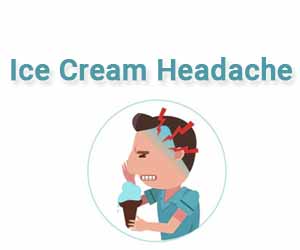- Home
- Editorial
- News
- Practice Guidelines
- Anesthesiology Guidelines
- Cancer Guidelines
- Cardiac Sciences Guidelines
- Critical Care Guidelines
- Dentistry Guidelines
- Dermatology Guidelines
- Diabetes and Endo Guidelines
- Diagnostics Guidelines
- ENT Guidelines
- Featured Practice Guidelines
- Gastroenterology Guidelines
- Geriatrics Guidelines
- Medicine Guidelines
- Nephrology Guidelines
- Neurosciences Guidelines
- Obs and Gynae Guidelines
- Ophthalmology Guidelines
- Orthopaedics Guidelines
- Paediatrics Guidelines
- Psychiatry Guidelines
- Pulmonology Guidelines
- Radiology Guidelines
- Surgery Guidelines
- Urology Guidelines
Ice cream headache- Yes ice cream can cause headache, confirms study

Ice cream is a favourite dessert of most children and even adults. They are forbidden in weight watchers and also people suffering from diabetes. But even people with migraine have to be careful while eating ice cream as it may trigger a headache. Such a headache is called ice cream headache, cold stimulus headache, trigeminal headache or sphenopalatine ganglion neuralgia that decreases the pleasure of eating ice cream. Ice cream headaches can affect anyone even people who don't have migraine but the probability of such an event is more in known migraine patients.
Researchers at the Department of Neurology, at Martin-Luther-University Halle-Wittenberg, and St. Georg Hospital, Leipzig, Germany have found that eating ice cream may cause you a headache. The new study has appeared in Cephalalgia, the official journal of the International Headache Society.
The authors investigated 618 adults, students and staff from the university, who filled a questionnaire about headaches. Half of the population had a headache after the ingestion of a cold stimulus, regardless of having a diagnosis of migraine or tension-type headache.
The pain was referred to as moderate, lasted less than 30 seconds and occurred in frontal and temporal areas in most individuals. Associated symptoms happened in half of the headaches (tearing, seeing flashing light dots, eye redness, and running nose).
Ice cream headache occurs when something extremely cold touches the upper palate and it typically happens when the weather is very hot, and the individual consumes something cold too fast.
A preventative cure of Ice cream headache is by reducing the cold stimuli on the palate, which means avoiding large amounts of cold food or drink at once.
Once it sets in the treatment includes:
- drinking some warm water
- pushing the tongue to the roof of the mouth, which helps warm the area
- covering the mouth and nose with the hands and breathing rapidly to increase the flow of warm air to the palate
For further reference log on to :
Study's link: https://doi.org/10.1177/

Disclaimer: This site is primarily intended for healthcare professionals. Any content/information on this website does not replace the advice of medical and/or health professionals and should not be construed as medical/diagnostic advice/endorsement or prescription. Use of this site is subject to our terms of use, privacy policy, advertisement policy. © 2020 Minerva Medical Treatment Pvt Ltd